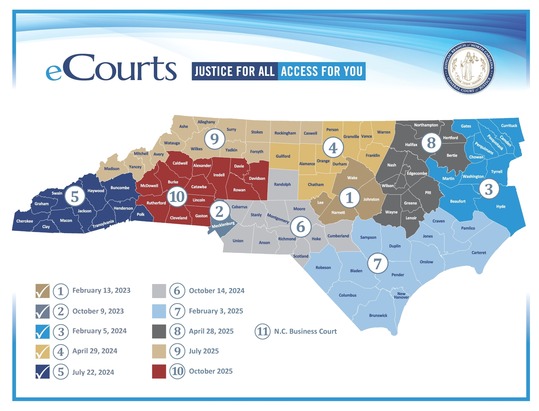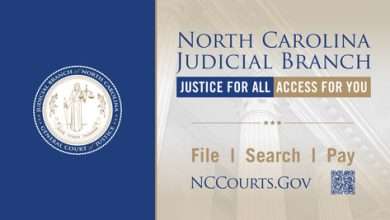
Last Updated on August 14, 2024 11:47 am
RALEIGH — Plans to complete the eCourts expansion to trial courts across all 100 counties in 2025 and the North Carolina Business Court were announced today by the Administrative Office of the Courts (NCAOC).
Details of the eCourts transition announced today include all remaining county groupings for Tracks 7-10, two go-live dates for 2025, and the conversion of the North Carolina Business Court as Track 11.
eCourts currently serves about half of North Carolina’s population in its three largest cities and 38 counties across the coastal, piedmont, and mountain regions. Millions of electronic filings and online records searches have dramatically reduced the intake of paper into the court system during the expansion, connecting citizens to public records online 24/7 instead of limiting access to in-person visits during business hours for paper files.
“The Business Court looks forward to transitioning its case filing system into eCourts, thereby completing the creation of a unified electronic filing system for civil cases in the state’s 100 counties,” said Chief Judge Louis Bledsoe and Judge Michael Robinson of the North Carolina Business Court.
Digital records are easing burdens on limited facilities space, reducing courthouse foot traffic at security checkpoints and customer counters, and transforming public access to vital court records for the future of North Carolina.
“Millions more North Carolinians will benefit from the convenience of digital access to their courthouse in 2025 as momentum builds for statewide completion of the historic eCourts transition in the Judicial Branch,” NCAOC Director Ryan Boyce said.
More than 1.3 million electronic filings have been accepted through eCourts, saving an estimated 5 million pieces of paper since February 2023. The eCourts Portal application provides the public no-cost access to digital court records, averaging more than 1.5 million online searches per month.
The NCAOC introduced new kiosks in eCourts counties this summer that provide a public access point inside courthouses for scanning, printing, payment services, and online search and filing, to further benefit customers with limited access to online services. Other benefits of the eCourts transition include:
- Helping customers file common legal actions through the online Guide & File service that assists users with an interview-style forms process.
- Empowering the public with access to justice online 24/7 to check court dates, find records, and file documents instead of limiting access to courthouses during business hours.
- Reducing travel time to courthouses for the public by expanding videoconferencing and creating shared digital access to records.
- Saving valuable courthouse facilities space and millions of sheets of paper through electronic workflows.
- Standardizing court business processes and forms to promote consistency and predictability statewide.
- Connecting eCourts systems with public safety systems to help court officials and law enforcement file and access critical information.
- Updating hardware infrastructure, network bandwidth, and wireless connectivity in courthouses for better and faster internet connectivity for both court officials and the public.
- Updating cybersecurity and data recovery capability systems from aging and costly mainframe technology to state-of-the-art cloud services.
- Providing a training hub with on-demand guidance and Q&As for the public for electronic filing and search applications, Quick Reference Guides, FAQs, and workflows by case type.
- Providing judges and staff remote access to electronic case files from different locations; when used with videoconferencing, this access reduces travel time and increases judicial availability especially in rural and multi-county districts.
- Reducing foot traffic in courthouse facilities, shortening lines at security checkpoints and customer service counters.
- Freeing court staff to handle complex issues for court customers by lowering the volume of phone calls regarding court date and records inquiries.
- Centralizing a statewide financial management system to facilitate more convenient, transparent, and timely payments to the court system.
- Reducing the number of returned forms that are filled out incorrectly resulting in court delays for self-represented litigants.
North Carolina’s transition to digital court records stands out among its peers by unifying all 100 counties across every case type in a cloud-hosted environment integrated with public safety applications.
Preparations and walkthroughs for each track of the eCourts transition begin months in advance to train court officials and the public on new technologies and processes, install improved network infrastructure in courthouses, customize programming integrations, and migrate case event data and court records from mainframe indexes and paper to a cloud-hosted environment. A large network of IT and software systems teams from NCAOC supports eCourts through training, on-site assistance, remote monitoring, and help desk response.
Learn more about eCourts at NCcourts.gov/eCourts.


















